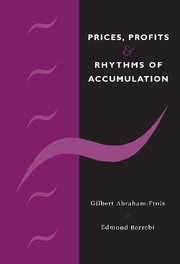Book contents
- Frontmatter
- Contents
- Preface
- 1 The golden rule of accumulation and prices
- 2 Systems of production prices
- 3 Irregular and decomposable systems
- 4 The analysis of joint production
- 5 Standards and blocking goods
- 6 Labour values and the problem of transformation
- 7 Switch in methods of production
- 8 The dynamic evolution
- Notes
- References
- Index
6 - Labour values and the problem of transformation
Published online by Cambridge University Press: 06 July 2010
- Frontmatter
- Contents
- Preface
- 1 The golden rule of accumulation and prices
- 2 Systems of production prices
- 3 Irregular and decomposable systems
- 4 The analysis of joint production
- 5 Standards and blocking goods
- 6 Labour values and the problem of transformation
- 7 Switch in methods of production
- 8 The dynamic evolution
- Notes
- References
- Index
Summary
The debate over ‘transformation’ is not purely theoretical; it is not only concerned with the problem of the transformation of labour values into prices of production, but also with Marx's definition of the rate of profit. However, the current theory of production prices shows that they are determined simultaneously with profit and thus are independent of labour values. The famous formula given by Marx as the definition and the basis to calculate the average rate of profit is therefore wrong (except in specific cases). It is possible, however, to enhance the relation (that is different from Marx's) between a properly defined rate of profit and the rate of exploitation.
We shall thoroughly analyse the (peculiar and therefore unimportant) cases for which Marx's formulation is revealed to be correct. We shall also emphasise the fact that Marx's presentation can be analysed as the starting point of an iteration, which, provided it is completed, comes close to the current theory of production prices.
We shall also have to revert to the case of the decomposability of production structures: according to some hypotheses, ‘luxury’ goods, or more precisely non-basic goods, may be produced in such conditions that the mere existence of a production price system is questioned. A certain number of paradoxes may also be emphasised in the case of joint production; as a result, the labour value theory, which is concerned neither with natural resources nor with non-reproducible goods cannot be applied to non-separately reproducible goods. Finally, we shall give more precise details on the relation between capitalists's consumption and accumulation.
- Type
- Chapter
- Information
- Prices, Profits and Rhythms of Accumulation , pp. 148 - 175Publisher: Cambridge University PressPrint publication year: 1997



